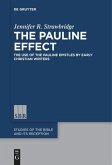The early Christian movement known as "Montanism" referred to itself as the "New Prophecy". This collected volume, featuring contributions from the first-ever symposium on the New Prophecy, examines the origins of the Phrygian New Prophecy during the pandemic under Marcus Aurelius, its debated presence in North Africa and its relation to Tertullian, its relationship with mainstream Christians in Asia, its female leaders, and its echoes in the writings of Lucian of Samosata, Celsus, Origen, Eusebius, Epiphanius, and Honorius's legislation. The book concludes with a systematic-theological reflection for today's churches and William Tabbernee's bibliography. Contributions by Heidrun E. Mader, Bernard Doherty, Peter Lampe, David E. Wilhite, Andrew McGowan, Petr Kitzler, Megan DeVore, Barbara Crostini, Ronald E. Heine, Ilaria L.E. Ramelli, Maria Dell'Isola, Andrzej Wypustek, Geoffrey D. Dunn, Alistair C. Stewart, and Gyula Homoki.
Bitte wählen Sie Ihr Anliegen aus.
Rechnungen
Retourenschein anfordern
Bestellstatus
Storno








